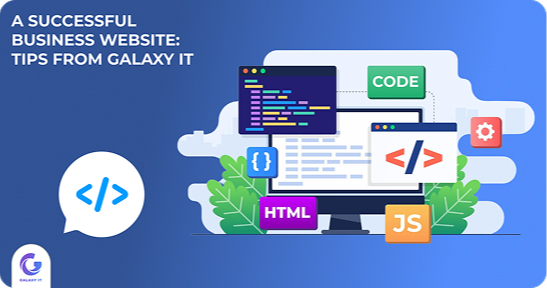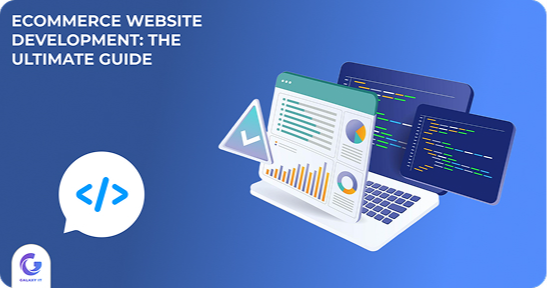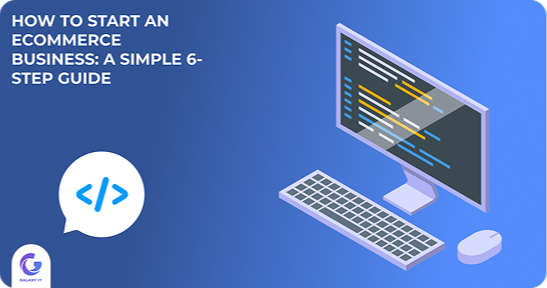Custom eCommerce web development in 2024 - everything you need to know
- 19.04.2024
- 47 views
- 5 min
Introduction
The realm of e-commerce, from online marketplaces offering goods and services to various platforms for product sales, is currently experiencing a surge. In such a competitive environment, a crucial advantage lies in the custom development of e-commerce websites. Companies are increasingly turning to bespoke solutions tailored to their needs and objectives.
Custom web development for e-commerce entails not just creating an online shop but also crafting a unique and functional tool that meets the specific needs of the business and its customers. Even in different sectors, where competition is high, a customized approach can be a key factor for success. Exactly that, enhances customer engagement, and improves their online shopping experience.
This approach enables companies to tailor solutions to the specific requirements of their business, providing the flexibility necessary in an environment of constantly changing market conditions and technological innovations. For example, a custom-built website may incorporate functionality that enhances conversion rates, improves page loading speeds, or enhances security and protects user data.
Stages of creating a customised e-commerce website
Custom development refers to the process of creating an online platform tailored to the specific needs and objectives of a business. This approach involves a series of distinct stages aimed at crafting a unique and functional website that delivers an exceptional user experience, drives engagement, and maximizes conversion rates.
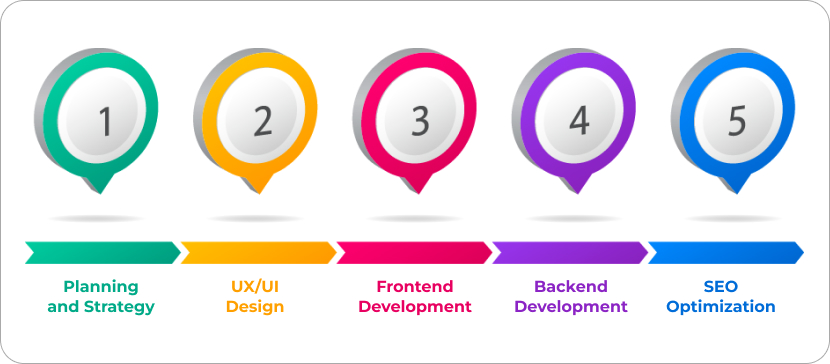
- Planning and Strategy: The first stage involves comprehensive planning and strategy development. This includes defining the project scope, identifying target audience demographics, conducting market research, and outlining the website's goals and objectives. Strategic planning lays the foundation for the entire development process and ensures alignment with business objectives.
- UX/UI Design: User Experience (UX) and User Interface (UI) design are crucial elements of custom eCommerce development. UX design focuses on enhancing the usability and accessibility of the website, ensuring intuitive navigation and seamless interactions for users. UI design, on the other hand, involves creating visually appealing interfaces that reflect the brand identity and engage users effectively.
- Front-end Development: Frontend development involves the creation of the website's client-side interface, including the design elements visible to users. This stage requires expertise in HTML, CSS, and JavaScript to translate the UX/UI designs into functional web pages. Frontend developers work to ensure that the website is responsive, accessible across various devices, and optimized for performance.
- Back-end Development: Backend development comprises the implementation of server-side functionalities that power the website's functionality. This includes setting up databases, developing server-side logic, and integrating third-party services or APIs. Backend developers work with technologies such as PHP, Python, Ruby on Rails, or Node.js to build robust and scalable web applications that handle data processing, user authentication, and other essential functions.
- SEO Optimization: Search Engine Optimization (SEO) is integral to custom eCommerce development as it determines the website's visibility and ranking in search engine results. SEO optimization involves optimizing website content, meta tags, URLs, and site structure to improve organic search visibility and attract targeted traffic. Developers implement SEO best practices throughout the development process to ensure that the website is search engine-friendly and ranks competitively for relevant keywords.
Benefits of Customized eCommerce Web Development:
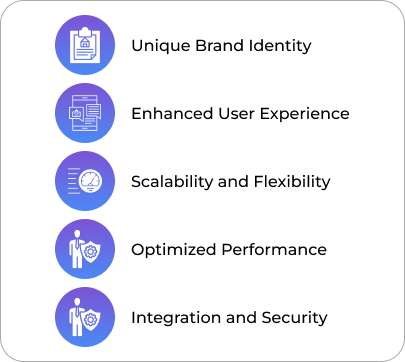
- Unique Brand Identity: Customized eCommerce websites help businesses establish a unique brand identity through tailored design elements and branding, setting them apart from competitors.
- Enhanced User Experience: Tailoring the website's design and functionality to the target audience results in an improved user experience, leading to higher engagement and conversion rates.
- Scalability and Flexibility: Custom eCommerce solutions offer scalability and flexibility, allowing businesses to adapt to changing requirements and grow over time without constraints.
- Optimized Performance: Custom development ensures optimized performance with fast page load times and smooth navigation, enhancing user satisfaction and retention.
- Integration and Security: Custom eCommerce websites seamlessly integrate with third-party systems and provide robust security measures tailored to the business needs, ensuring efficient operations and data protection.
By embracing customized eCommerce web development, businesses can not only meet the evolving needs of their customers but also stay ahead in the competitive online market, ultimately driving success and profitability.
Who Needs Custom eCommerce Websites?
Custom eCommerce websites are essential for a wide range of businesses across various industries, catering to specific needs and objectives. Here's a breakdown of the types of businesses and their goals that necessitate the development of custom eCommerce websites:
| Small and medium-sized enterprises: Goal: E-commerce for businesses needed to establish an online presence and compete with larger competitors. With a method to showcase their unique products or services and differentiate themselves in the market. |
Entrepreneurs and Startups: Goal: Entrepreneurs and startups seeking to enter the eCommerce space require custom websites to build their brand identity and create a strong online platform from the ground up. Customization allows them to tailor their website to their niche market and establish a competitive edge. |
| Specialized Niche Businesses: Goal: Businesses operating in specialized niches, such as luxury goods, handmade crafts, or artisanal products, require custom eCommerce websites to showcase their unique offerings effectively. These businesses target specific customer segments and need tailored solutions to meet their unique requirements. |
Businesses with Unique Product Offerings: Goal: Companies offering unique or customizable products, such as personalized gifts, bespoke clothing, or custom-built furniture, benefit from custom eCommerce websites. These businesses require features that enable customers to personalize their orders and create a seamless shopping experience. |
The price of creating a custom eCommerce website
Determining the cost of custom eCommerce website development involves various factors that influence the overall budget and expenses. On average, the cost of building a custom eCommerce website typically ranges from $10,000 to $500,000 or more, depending on the complexity of the project, the required features and functionalities, and the level of customization.
Several factors can contribute to the increase in development costs. Firstly, the complexity of the design and functionality significantly impacts the overall budget. Custom designs, intricate features, and advanced functionalities such as user accounts, payment gateways, and product customization options can all add to the development costs. Additionally, integration with third-party services or APIs, such as payment processors, shipping providers, or CRM systems, may require additional resources and increase the overall expenses.
Another factor affecting the cost is the choice of technology stack and development platform. Using advanced technologies such as Laravel or choosing a customised solution can lead to higher development costs compared to using existing frameworks or templates. Additionally, ongoing maintenance, upgrades, and support services should also be considered as part of the overall budget, ensuring the long-term sustainability and success of the e-commerce website.
